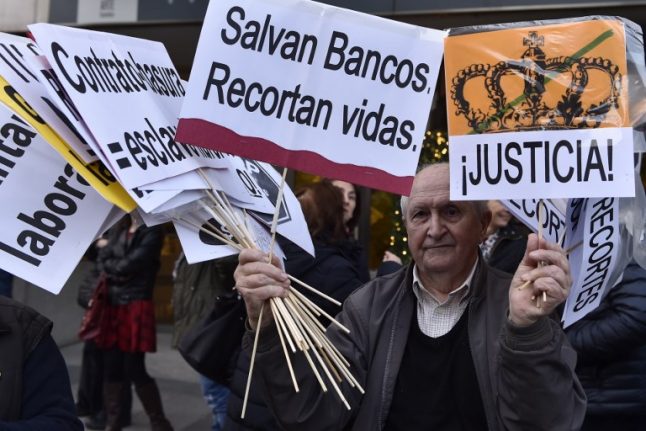The pensioners, many with whistles and wearing ribbons with the brown symbol of their cause, marched in the capital Madrid as well as Barcelona, Bilbao, Seville and Granada.
The union-organised rallies called for “dignified” pensions, saying that the conservative government's 0.25 percent increase fails to keep up with inflation, as Spain's consumer prices rose by 1.2 percent last year.
Former waiter Jose Maria Elias, 66, was one of the hundreds of demonstrators gathered outside Spain's lower house of parliament in Madrid on Thursday.
“The 0.25 percent increase is shameful,” Elias told AFP, adding that he receives €950 ($1,170) a month.
“Let all the corrupt people return what they stole and put it in the pension fund,” he said, referring to the numerous corruption scandals of Prime Minister Mariano Rajoy's ruling party.
READ: Seven facts that show the dark reality of Spain's economic recovery
“They have demolished our public pension system,” said Josefa Albala, 77, who added that she uses her retirement money to feed her unemployed daughter.
After coming to power in 2011 as the country struggled in the wake of the global financial crisis, Rajoy's government imposed tough austerity measures and was strongly criticised by the opposition for dipping into a €66.8 billion pension reserve fund.
Rajoy has recently encouraged Spaniards to invest in private pension plans, and a Socialist party lawmaker accused him of seeking to “privatise pensions” during a tense Senate session on Tuesday.
However, Rajoy has said that protecting the public pensions system is a top priority and it would become viable thanks to employee contributions as salaries rise with the recovering economy.
Spain has one of the lowest birth rates in Europe and there are concerns the burden on its pension system will increase in the future, with 25.6 percent of the population expected to be aged over 64 by 2031.
Every Thursday we'll deliver a free dose of news and views from Spain straight into your inbox. The newsletter will inform you about what's going on in Spain and (hopefully) entertain you with a selection of features. Sign up here.




 Please whitelist us to continue reading.
Please whitelist us to continue reading.